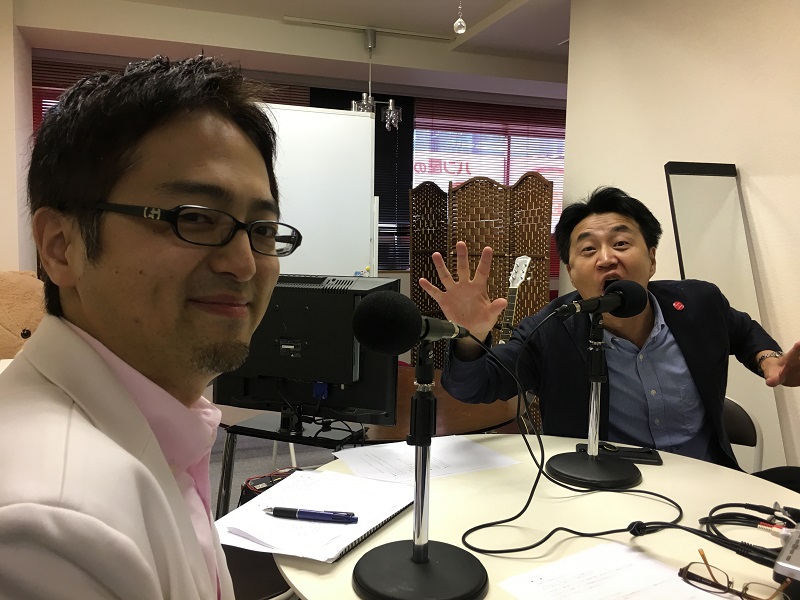Contents
こんにちは、イングリッシュ・ドクターの西澤 ロイです。
このコーナー「英語でSpeak Up!」も第4回目を迎えました。
東進ハイスクールのカリスマ英語講師、
安河内哲也先生は今回が最終回となります。
前回、時間切れで話せなかったことと、
「おもてなし」についてSpeak Upしていただきました。
↓↓↓
英語でSpeak Up! #004:おもてなし
英語の文字起こし&日本語訳
安河内式「英会話における3番目のルール」
安河内:The last time, I forgot to talk about Yasukouchi’s third rule for speaking English.
(前回、安河内式「英会話における3番目のルール」に触れられませんでした)
The third rule is, of course, “speak in a loud voice.”
(3番目のルールはもちろん「大きな声でしゃべる」です)
Okay, I often talk with Japanese people, Japanese high school students in English.
(私はよく日本人、それも高校生と英語で話します)
But their voice is small. Sometimes I can’t hear what they’re saying.
(でも、彼らの声が小さいので、なんて言っているのか時々聞き取れません)
Okay, I’m over fifty years of age, and my hearing is getting weaker.
(私も50歳を超えましたし、耳が遠くなっていることもあるでしょう)
――(Giggle)
安河内:So I can’t hear them sometimes because their voice is so small.
(彼らの声が小さいから、聞き取れないのです)
Maybe because they’re nervous. Maybe because they are not confident of their English.
(もしかすると、ナーバスになっているのかもしれません。英語力に自信がないのかもしれません)
But always be confident when you speak in English, okay?
(しかし、英語を話すときには常に堂々とするべきなんです)
Maybe ninety percent of the reasons why Japanese English are not understood by foreign visitors is because their voice is too small.
(日本人の英語が外国人に理解してもらえない原因の90%は多分、声が小さすぎるからなのです)
So speak in a loud voice.
(ですから、大きな声でしゃべりましょう)
HELLO! HOW ARE YOU!!
(こんにちは! お元気ですか!って)
――(Giggle)
安河内:And they will understand you, okay?
(そうすれば理解してもらえますよ)
「おもてなし」に関するアドバイス
安河内:And let’s talk about Omotenashi a little bit.
(そして「おもてなし」についてちょっとお話しましょう)
When you meet, uh, foreign people, you know, looking at maps on the street, don’t pass them by.
(もし地図を見ている外国人の方に会ったら、素通りしてはいけません)
That’s very important.
(これはとても大事なことです)
You should be kind to people in trouble, okay?
(困っている人にはやさしくすべきですよね)
Even in… even to Japanese people when they’re in trouble in front of you, you help them.
(日本人の場合にも、あなたの目の前で困っている人がいるなら、助けてあげますよね)
You have to do the same to the foreign people in trouble.
(困っている外国人の方にも同じようにしてあげましょう)
And I live in Roppongi as you know.
(ご存知の通り、私は六本木に住んでいます)
And I often see people looking at maps and are in trouble.
(よく、地図を見て困っている人を見かけます)
But the people are passing them by.
(でも、周りの人たちは素通りするんです)
And that’s bad. I feel very bad, so I always help them.
(それは良くないと思います。申し訳ない気持ちになり、私はいつも話しかけるのです)
いきなり英語で話しかけては失礼!?
安河内:And my tip here is… use this expression.
(ここで1つコツがあります。この表現を使うんです)
“May I help you?” or “Hello. Are you in trouble?”
(お手伝いしましょうか? こんにちは、お困りでしょうか?)
“Are you in trouble? You need any help?” “May I help you?”
(お困りでしょうか? お手伝いは必要ですか? お手伝いしましょうか?)
But first you can say “こんにちは” maybe.
(でも、最初に日本語で「こんにちは」と言うのが多分良いでしょう)
――Hum.
(なるほど)
安河内:Yeah, I think this is a good habit. “こんにちは”.
(「こんにちは」で始めるのをクセにすると良いと思うんです)
――”こんにちは。”
安河内:Yeah. Because… you see foreign people. By the appearance,uh, you sometimes have this assumption that they speak English.
(はい、なぜなら外国人を見かけた時、つい見た目から、英語を話すだろうと決めつけてしまいがちです)
But sometimes this might be… rude.
(でもそれは時にはちょっと失礼かもしれません)
They’re in Japan.
(彼らは日本にいるのです)
So just looking at the color of their hair, color of their skin, you say “oh, hi, how are you?” and “may I help you?”
(ただ髪の色や肌の色を見て、英語で話しかけるのです)
Some people might feel… this is a little rude.
(中には、ちょっと失礼だと思う人もいるでしょう)
――Hum.
(なるほど)
安河内:So maybe you can say “こんにちは。Do you speak English? May I help you?”
(ですから、まず日本語で「こんにちは」の後に「英語通じますか? お手伝いしましょうか?」)
――なるほど…。
安河内:Yeah, this might be a good habit.
(はい、これをクセにすると良いかもしれません)
And then after that you use this expression “like this”.
(その後は「like this(こんな感じ)」という表現を使うんです。
This is very convenient.
(これはとても便利ですよ)
Okay? Looking at the maps and pointing at places, you say “you go to Roppongi Hills like this.”
(地図を見ながら指を指して「六本木ヒルズには“こんな感じ”で行きます」)
Okay? “You eat Soba – buckwheat noodle – like this.”
(いいですか?「そばは“こんな感じ”で食べます」)
And then you can get by. Okay, even if your English is not good enough.
(そうすれば、英語力が今一つでもなんとかこなせるでしょう)
So this is a tip I want to give you…
(これがお伝えしたかったコツです)
――Time’s Up!
(そこまでです)
